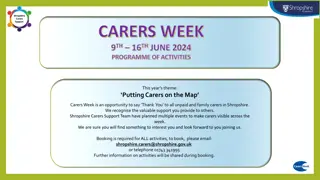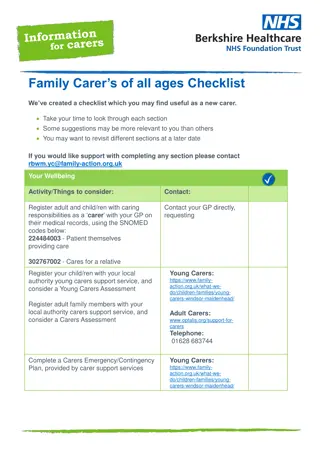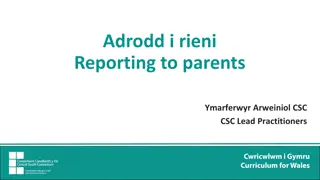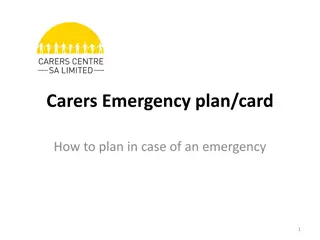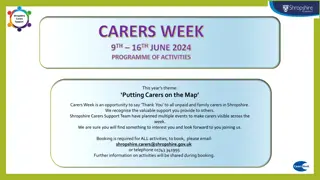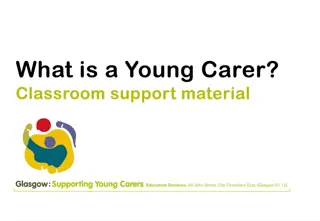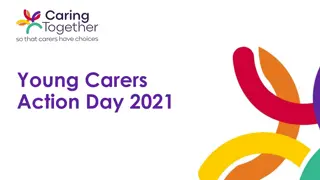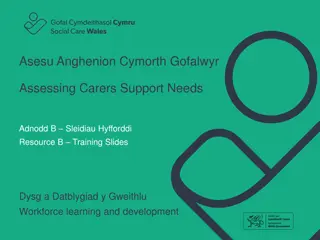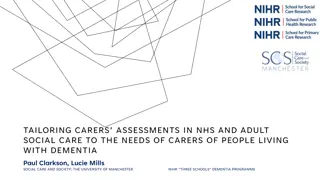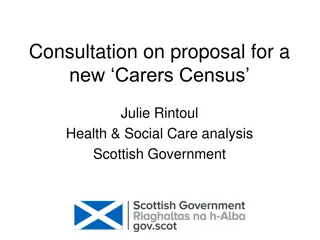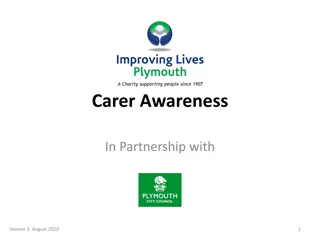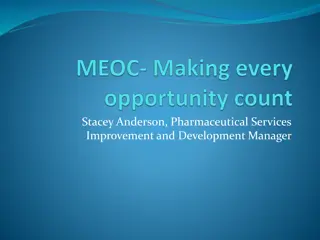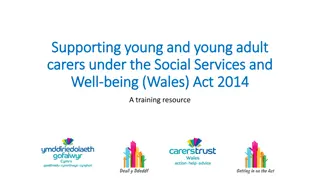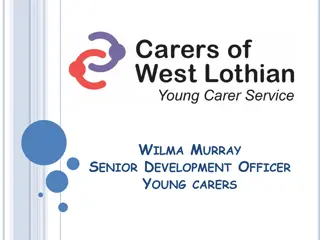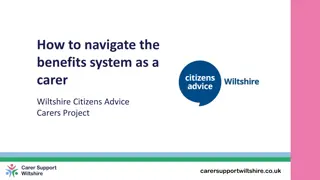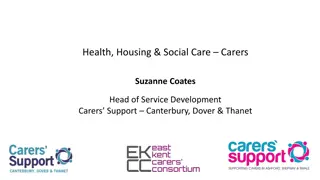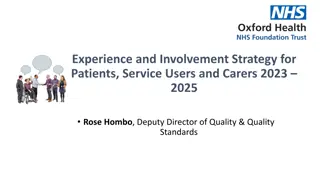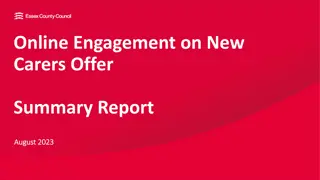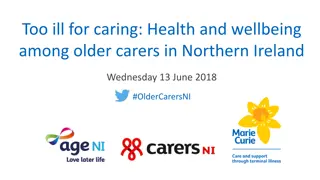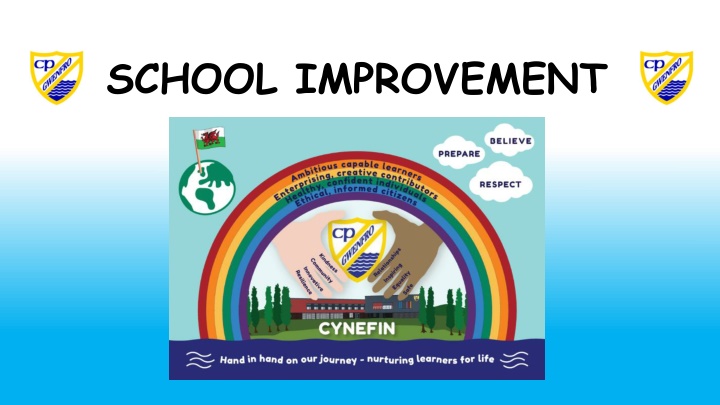
School Improvement Initiatives for Enhanced Student Outcomes
Explore the progress and impact of school improvement priorities for 2023-2024, focusing on enhancing the curriculum, upgrading Math standards, and improving extended writing skills. The self-evaluation summary highlights strengths in teaching and learning, well-being support, and inclusive practices. Discover how the school's vision, collaborative planning, and effective teaching strategies contribute to a holistic approach to education.
Download Presentation

Please find below an Image/Link to download the presentation.
The content on the website is provided AS IS for your information and personal use only. It may not be sold, licensed, or shared on other websites without obtaining consent from the author. If you encounter any issues during the download, it is possible that the publisher has removed the file from their server.
You are allowed to download the files provided on this website for personal or commercial use, subject to the condition that they are used lawfully. All files are the property of their respective owners.
The content on the website is provided AS IS for your information and personal use only. It may not be sold, licensed, or shared on other websites without obtaining consent from the author.
E N D
Presentation Transcript
Progress of 2023-2024 Priorities Priority 1 Priority 2 Priority 3 To continue to develop our provision and approach towards the reform journey in Wales To improve the standard of pupil outcomes in Maths throughout the school To improve the standard of extended writing across the school IMPACT IMPACT IMPACT Curriculum map for Gwenfro continued to evolve and was monitored by AOLE teams for coverage. Planning systems were reviewed based on staff feedback and developments in staff knowledge and understanding. We continue to develop an awareness of The 4 Purposes across the school community through Come & See sessions, authentic learning experiences, use of language and display. We continued to develop RSE and RVE as a mandatory elements of the curriculum. We embedded and further developed provision for TUP pupils and monitored the impact. We further developed provision for UP pupils with positive outcomes. We developed IDP s for all identified ALN pupils. We introduced White Rose Maths from Reception to Year 6 We introduced Ten Town in Nursery and Dosbarth Penrhyn (where appropriate) with positive feedback and outcomes. We ensured that maths provision at Gwenfro meets the requirements of Curriculum for Wales. We audited and developed maths resources. We reviewed and developed procedures for tracking pupil progress in Maths with positive outcomes. Staff understanding and awareness of the process of emergent writing improved through research. Pupils emergent writing skills improved at the appropriate stage in their development. We began to develop a more consistent and effective approach to the delivery of Language sessions, with a particular focus on writing outcomes. Staff completed professional research and developed their understanding of the importance of introducing key vocabulary. Opportunities for pupils to develop key vocabulary across the curriculum clearly planned. Improved progression in the development of key vocabulary across the school. The process of developmental marking across the school is developing.
Self Evaluation Summary TEACHING & LEARNING Well-being, care support and guidance Leading & Improving What we do well .. A vision and Curriculum Rationale is established. Teaching and Learning is based around the 4 purposes. Collaborative planning supports our holistic approach. Effective teaching and Learning strategies are embedded into everyday practice. All staff work collaboratively to develop consistently high-quality provision across the school based on current research and training. All staff strive to deliver engaging, challenging and stimulating learning experiences. Support staff are deployed effectively throughout the school. Consistent approach to supporting pupils with ALN. Provision is effective at all levels. Assessment information through data analysis and pupil progress meetings informs future learning needs and pupils next steps. Skills, knowledge and experiences are incorporated into our authentic learning experiences Our curriculum reflects the school s local area. What we do well .. Most pupils have good attitudes to keeping safe and healthy. Behaviour in school is very good. Support is provided for identified pupils. Positive working relationships ensure pupils feel safe and valued. Provision for well-being is very good. PDG is used effectively to support pupils. There is a wealth of opportunities to develop pupils cultural understanding and appreciation. Good provision for pupils who are physically disabled allows them to partake in everyday aspects of school life as equals. Nearly all pupils develop a sound understanding of equal opportunity issues and of diversity within society. School actively prepares pupils for experiences of adult life. Pupils are more aware of their own well-being and strategies to manage this through explicit teaching and set sessions. Provision to encourage pupils to be physically and mentally healthy is effective. School provides opportunities for extra-curricular visits both locally and further afield. Pupil influence is developing when planning new topics. Arrangements for safeguarding pupils within the school are appropriate. Attendance shows an improving trend. What we do well .. Collaborative working significantly impacts on standards. High expectations are communicated to all staff. Staff are deployed effectively and have clear roles and responsibilities which meets the needs of the school. Effective communication with all stakeholders. Leaders develop and maintain improvements. School vision is clear. Good communication with parents/carers. Robust self-evaluation informs school improvement planning. Development and implementation of Curriculum Wales continues to be led effectively. Cluster working is developing. The school engages with a range of external agencies and/or support network to enhance the curriculum and support pupil s individual needs. The way in which we report to parents/carers has been developed. Roll out of the new curriculum has been carefully managed and supported. The school ensures that local and national priorities are consistently addressed. Governors continue to lead well and are developing in effectiveness. Key areas for improvement are: Further development of curriculum design is needed to support progression of skills and align expectations. This needs to involve AOLE teams and departments, through collaborative working with GWE and cluster. To revisit developmental marking and feedback to help to improve pupils ability to improve their own work and extend their learning. IDP and TUP pupil task setting in class needs to be more appropriate to further support small steps targets. Key areas for improvement are: Daily check in opportunities needs to be more robust and consistent across the school. Communication between the well-being team and staff. Develop the role of FEO. Role of pupil groups. Whole school approach to well-being (My Happy Mind) and RSE. Whole school attendance and punctuality. Further develop pupil voice in approach to activities. Monitoring of provision for TUP pupils. Develop links with like schools to review effective ALN practice. Action areas for improvement are: Consistency in monitoring. The role of AOLE teams to have a voice in development of the draft curriculum map needs to be an area of focus, to complete further up to date research and create a roadmap moving forward. Further work around specific strands of learning is needed and clear alignment of expectations at key points. Improved cluster working and collaboration. Engagement of the parents/carers. Monitoring funding expenditure against impact. Governor visits.
School Improvement Plan 2024-2025 Priority 1 Priority 2 To improve the standard of pupil outcomes in writing. To develop systems and procedures that support pupil progression. To further imbed the process of developmental marking as a process to support progression in pupils writing. To continue to develop pupils emergent writing skills and greater independence. To develop a progression expectations for grammar and punctuation. To develop a progression expectations for sentence composition. Continue to plan emergent writing opportunities across the curriculum from EY onwards. To continue to support staff in the development of effective teaching and learning in Language. To continue to develop strategies to improve pupils vocabulary. To introduce a progressive framework for the teaching of spelling. To improve the consistency in approach to the teaching of phonics. To develop cursive handwriting style. To maintain and further develop presentation expectations. To develop opportunities for independent extended writing across the curriculum that relates to previous learning. To develop a shared understanding of the key principles and purposes of assessment and progression. Develop a clear picture of what assessment and learner progression looks like at Gwenfro (procedures and strategy). To review progression in planning across all AOLE s. To review the process of planning for predicated needs to ensure progression of skills, knowledge and experience. To develop an overarching expectation of the expected standard at the end of R, Y3 and Y6. To develop feedback strategies that support progression in pupil outcomes. To develop the quality of written feedback and impact on pupil outcomes.
How were these priorities determined? How will these priorities be implemented? The School Improvement Plan includes clear action steps for each priority, responsibilities, training needs and success criteria. The Senior Leadership Team review the School Improvement Plan regularly and respond as necessary. The school follows a set evaluation and monitoring cycle which includes a specific monitoring week each term. Our monitoring weeks allows for scrutiny; from lessons to books, questionnaires, data to discussions. Everything is collated and analysed before deciding on any action. Outcomes feed into our School Improvement Plan. Professional Development Support All members of staff follow the Performance Management procedures which sets out what training and tasks they will need to do to fulfil these priorities. Training Days are used to provides professional development for staff to address aspects of the School Improvement plan. Professional development for staff via GWE offer and external providers. ALN training and support via GWE and Wrexham LA. Support from cluster schools via School Partnership Programme. Other professional networks. Support and Engagement from parents/carers. Accountability The Governing Body has approved the School Improvement Plan and holds us accountable for its implementation. This is done through a Standards Sub-committee held every half term and Link Governor Meetings. Estyn will inspect the school every 3 years.

